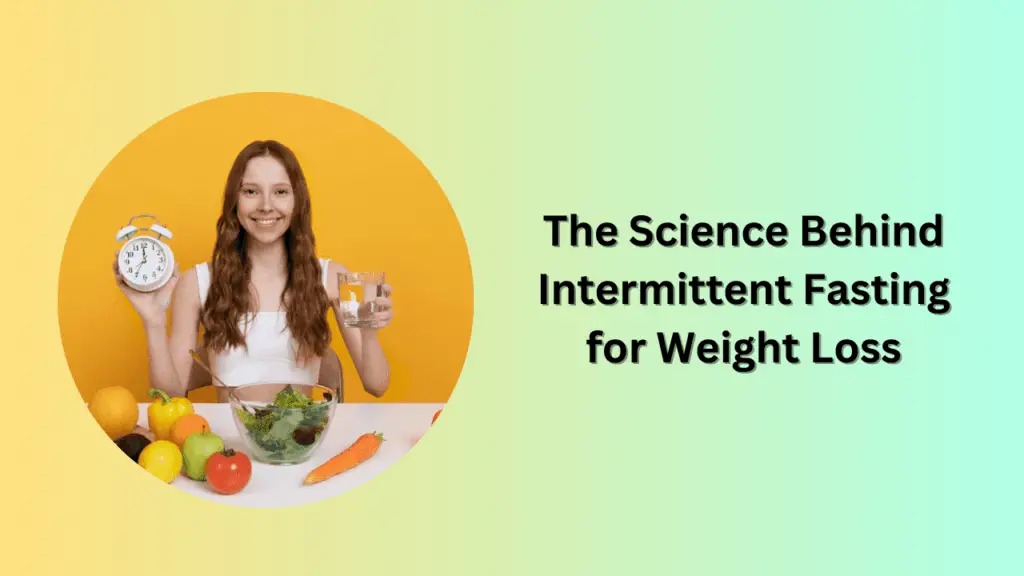Table of Contents
ToggleIntroduction
In our quest for a healthier lifestyle and a slimmer waistline, many of us have stumbled upon the concept of intermittent fasting. But what exactly is intermittent fasting, and how does it work its magic on our bodies when it comes to shedding those stubborn pounds? Let’s delve into the fascinating science behind intermittent fasting for weight loss.
Understanding Intermittent Fasting
Intermittent fasting is not a fad diet; it’s a pattern of eating that alternates between periods of fasting and eating. Intermittent fasting is different from traditional diets because it focuses on when you eat. There are various methods of intermittent fasting, such as the 16/8 method, the 5:2 diet, or alternate-day fasting. Regardless of the method, the primary goal remains the same: to create a prolonged period of fasting that allows your body to dip into its fat stores for energy.
Intermittent Fasting Formula
- 📘 Comprehensive Guide: Explore various fasting methods and tailor a plan to fit your lifestyle.
- 🍏 Health Benefits: Accelerate fat loss, boost metabolism, and gain mental clarity.
- 📚 Expert Advice: Nutritionist-backed tips, meal plans, and strategies for success.
- 💡 Sustainable Lifestyle: Ditch restrictive diets for a balanced and sustainable approach.
- 🎁 Bonus Resources: Enjoy delicious recipes, workout plans, and a progress tracker.
How Intermittent Fasting Affects Weight Loss

When you fast, especially for extended periods, your body’s insulin levels drop significantly. Insulin is a hormone that regulates blood sugar levels and also plays a crucial role in fat storage. Lower insulin levels during fasting make it easier for your body to burn fat, leading to weight loss. Additionally, during fasting, your body enters a state called ketosis, where it starts burning fat for fuel instead of glucose.
Metabolic Benefits of Intermittent Fasting
Intermittent fasting goes beyond just helping you shed weight; it also offers a myriad of metabolic benefits. Studies have shown that intermittent fasting can improve insulin sensitivity, reduce inflammation, lower cholesterol levels, and even enhance brain function. By promoting autophagy, a process where your body cleans out damaged cells, intermittent fasting can potentially slow down the aging process and reduce the risk of chronic diseases.
Hormonal Changes During Fasting
Another key aspect of intermittent fasting’s impact on weight loss is its influence on various hormones in our bodies. Fasting triggers the release of norepinephrine, a hormone that helps break down body fat for energy. Growth hormone levels also increase during fasting, which can aid in fat loss and muscle preservation. Leptin, the hormone that signals fullness, may also be positively affected by intermittent fasting, helping to regulate appetite.
Tips for Successful Intermittent Fasting

Embarking on an intermittent fasting journey can be daunting, especially if you’re new to the concept. Here are some tips to help you navigate the waters and make the most of your fasting experience:
Start Slow
If you’re new to fasting, begin with shorter fasting windows and gradually increase the duration as your body adjusts.
Stay Hydrated
Drink plenty of water during your fast to stay hydrated and avoid hunger pangs.
Listen to Your Body
It’s essential to pay attention to how your body responds to fasting. If you feel unwell or overly fatigued, consider adjusting your fasting schedule.
Choose Nutrient-Dense Foods
When it’s time to eat, focus on consuming whole, nutritious foods to support your overall health and weight loss goals.
Be Consistent
Intermittent fasting requires consistency. Stick to your chosen fasting schedule to see lasting results.
Different types of intermittent fasting

Intermittent fasting involves various methods that cycle between periods of eating and fasting. Here are some of the different types of intermittent fasting.
Time-Restricted Eating (16/8 Method)
Involves fasting for 16 hours and eating only within an 8-hour window, such as from noon to 8 p.m.
Alternate-Day Fasting
This method involves fasting every other day, limiting calories to 30% of your regular intake on fasting days, and eating normally on non-fasting days.
Eat-Stop-Eat
A 24-hour fast is observed once or twice per week, during which no calories are consumed.
5:2 Method
Fasting for two days out of seven is required, with a daily calorie intake of only 500-600.
Water Fasting
Involves drinking only water for specific periods, often used as part of detox diets but can be risky if not done carefully.
Partial Fasting
Eliminates certain foods or drinks from the diet for a set amount of time, like avoiding animal products or processed foods for a few days or weeks.
One Meal A Day (OMAD)
In this method, you can eat one nutrient-dense meal a day within an hour and fast for the remaining 23 hours.
Psychological Aspect of Intermittent Fasting

Beyond the physical benefits, intermittent fasting can also have a significant impact on your relationship with food and your eating habits. By creating set eating windows, intermittent fasting can help you become more mindful of what and how much you eat. It can also help you to reduce emotional eating and cravings, giving you more control over your eating habits.
Combining Intermittent Fasting with Exercise
Pairing intermittent fasting with regular exercise can amplify its effects on weight loss. When you work out in a fasted state, your body may burn more fat for fuel. Additionally, exercising can help preserve lean muscle mass, boost your metabolism, and improve overall physical fitness. However, it’s essential to listen to your body and adjust your exercise routine based on how you feel during fasting periods.
Common Mistakes to Avoid

When embarking on an intermittent fasting journey, it’s crucial to be aware of common mistakes to ensure successful implementation. Here are a few common mistakes that should be avoided.
Choosing the Wrong Program
Selecting an intermittent fasting plan that doesn’t align with your lifestyle or routine can lead to difficulties in adherence. It’s essential to find a method that suits your daily schedule and preferences to prevent giving up prematurely.
Consuming Too Many Calories
If you overeat during the eating window or consume too many calories after fasting, it can slow down progress. It’s important to be mindful of portion sizes and avoid overindulging during permitted hours.
Not Eating Enough
Restricting calories excessively when breaking the fast can result in muscle and bone mass loss, along with nutrient deficiencies. It’s crucial to ensure you’re consuming an adequate amount of nutrients during eating periods.
Not Gradually Transitioning
Abruptly transitioning from regular eating patterns to intermittent fasting can be overwhelming and lead to hunger, impatience, and negativity towards the diet. Gradually extending fasting periods over time can help ease this transition.
Being Too Hard on Yourself
Slipping up occasionally or deviating from the fasting schedule doesn’t negate all efforts. It’s important not to be too strict with yourself and allow room for flexibility and adaptation when starting intermittent fasting.
Not Considering Lifestyle Factors
Failing to consider your schedule, dietary preferences, activity level, and social commitments when choosing an intermittent fasting plan can make it challenging to adhere to. Selecting a plan that fits your lifestyle is key to long-term success.
Eating the Wrong Foods
Consuming unhealthy or calorie-dense foods during the eating window can counteract the benefits of intermittent fasting. Choosing nutrient-dense foods is essential for overall health and weight management.
Conclusion
Intermittent fasting is a powerful tool that harnesses your body’s natural processes to promote weight loss and improve overall health. By understanding the science behind intermittent fasting and following some simple tips, you can embark on a weight loss journey that is not only effective but also sustainable in the long run. Remember, consult with a healthcare professional before making any significant changes to your eating habits, especially if you have underlying health conditions. Embrace the journey, listen to your body, and enjoy the benefits that intermittent fasting can bring to your life. Let’s fast our way to a healthier, happier self!


